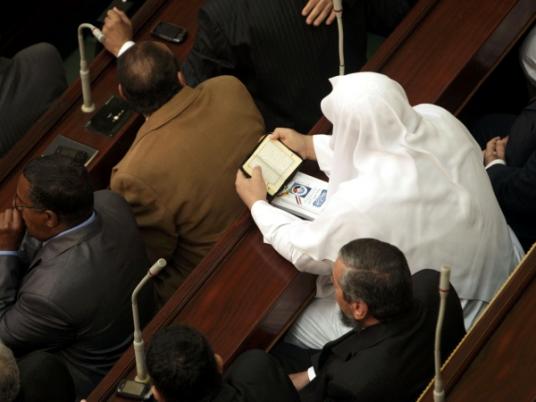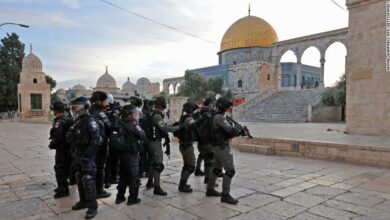
The newly elected post-revolution People's Assembly convened yesterday for an incredibly long-winded and sometimes farcical inaugural session. What was supposed to be a succession of regulatory procedures in which new MPs are sworn in and parliamentary heads are chosen was at times more controversial.
Independent Al-Shorouk says, "Parliament begins with a battle on the right to speak," the most prominent point of debate from the session: Salafi and liberal MPs attempted to illegally introduce variations on the parliamentary oath.
At the end of the oath, in which MPs merely pledge to protect citizens and uphold the law and constitution, some Salafi MPs added the line, "As long as God's law is not violated." At the same time, some liberal representatives’ addendums included promises to uphold the goals of the revolution. As the session chair Mahmoud al-Saqqa pointed out, it is illegal to add to the oaths. The state's flagship paper Al-Ahram calls these variations "additions," while Al-Shorouk calls them "distortions."
Privately owned Al-Tahrir asks legal experts whether or not MPs have the right to change the content of their oaths. Constitutional expert Essam al-Islambouly and international law expert Hossam Issa both said parliamentary bylaws clearly state it is illegal to change the oath. But another expert interviewed disagreed that the law clearly defines the oath as unchangeable. Al-Shorouk interviews mental health experts who interpreted the MPs' desires to distort the oaths as narcissistic.
State-run Al-Akhbar calls the oath episode "Parliament's first discord." The second was soon to follow. Many MPs argued over the procedures for voting for the speaker of Parliament, a post that the Freedom Justice Party's Saad al-Katatny predictably won. Wasat MP Essam Sultan wished to be given the floor to present his CV as a candidate, while FJP members objected as a matter of procedure, causing a brief yet tragically comical bout of arguments between supporters and opponents of Sultan's motion. Al-Shorouk calls the episode "the first confrontation between the majority [FJP] and the opposition."
Katatny won with a whopping 399 to 87 votes. Al-Akhbar and Al-Ahram prominently place a summary of Katatny's opening speech, in which he thanked the Supreme Council of the Armed Forces for its role in the transition and promised to uphold the revolution's goals.
FJP also dominated voting in 11 out of 17 parliamentary committees. In a not-so-subtle quip, Al-Ahram says, "FJP has taken over the NDP's seats," alluding to the similarity between the FJP's control and the now-dissolved NDP's parliamentary power during Hosni Mubarak's reign. Al-Tahrir does the same, saying, “The Brothers are sitting on the seats of the 'dissolved party.' "
Outside the Parliament building, three protests met to begin a popular lobbying process on the issues of social justice, rights of families of those martyred and injured during the revolution, and freedom of creativity. Al-Tahrir paints the freedom of creativity march as a direct message to Islamist parties in control of the People's Assembly to not stifle the arts through capricious religious edicts.
The demonstrations were also a precursor to plans for widespread demonstrations on the first anniversary of the 25 January revolution Wednesday. Al-Ahram runs a list of who's participating and for what reasons. While most revolutionary movements "invited people to join Wednesday's marches from Cairo's different squares to continue the revolution's goals, the Brotherhood and Salafi Nour Party invited their supporters to take to the streets in celebration of the revolution," Al-Ahram says. The paper also reports on Interior Minister Mohamed Ibrahim's plans to secure the streets and his ominous caution against thugs and infiltrators who attempt to mar the day.
According to Al-Shorouk, the Interior Ministry is preparing for a worst-case scenario Wednesday, as indicated in Ibrahim's Monday statement. The pro-revolutionary paper has a 12-page spread today entitled, "What is left of the revolution?" In it, Al-Shorouk highlights some of the main demands of the revolution that have not been addressed by the SCAF. Some of the articles speak of the SCAF's failure to even address the concept of social justice as a cornerstone of the revolution. "A year in, and we're still searching for the stolen riches," one headline reads. "There has been no bread or social justice," one article says, referencing a specific impoverished area of Cairo. Through interviews with martyrs' families and those injured during the revolution, four pages in the special section focus solely on the sacrifices many have made for the revolution's most important goals, and how they have neither achieved these goals nor been sufficiently supported or recognized by the state for their sacrifices. Al-Shorouk also focuses on the tragedy encapsulated in the continued use of military courts to try civilians, and how the SCAF used this to subdue revolutionary protests while allowing those deposed by the revolution to be tried as civilians.
Al-Tahrir and Al-Shorouk both print stories that say where the Wednesday marches will meet and how they will proceed to Tahrir Square. Al-Shorouk calls them "a return to the revolution's square one."
The continued trial of Habib al-Adly and six of his senior aides on charges of involvement in killing protesters also makes Tuesday's headlines. The former minister is still on trial, while many civilians have been tried without even lawyers present under military courts. Al-Ahram says the defense team doubts the veracity of evidence on CDs brought in to incriminate Adly. Al-Tahrir says his defense wants to implicate more military personnel in the killing of protesters on 28 January last year.
Egypt's papers:
Al-Ahram: Daily, state-run, largest distribution in Egypt
Al-Akhbar: Daily, state-run, second to Al-Ahram in institutional size
Al-Gomhurriya: Daily, state-run
Rose al-Youssef: Daily, state-run
Al-Dostour: Daily, privately owned
Al-Shorouk: Daily, privately owned
Al-Wafd: Daily, published by the liberal Wafd Party
Youm7: Daily, privately owned
Al-Tahrir: Daily, privately owned
Freedom and Justice: Daily, published by the Muslim Brotherhood's Freedom and Justice Party
Sawt al-Umma: Weekly, privately owned
Al-Arabi: Weekly, published by the Nasserist Party
Al-Nour: Official paper of the Salafi Nour Party




